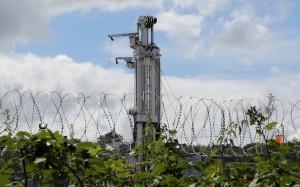by Peter Moskowitz / Al Jazeera

Environmentalists say students should be given a more balanced view of fracking.Gareth Fuller/AFP/Getty Images
An Ohio association funded by oil and gas drillers has been paying for teacher-training seminars in which industry-funded representatives demonstrate how students can learn about oil and gas extraction in fun ways, the Columbus Dispatch newspaper reported.
Environmentalists said Saturday that the program, being conducted by the Ohio Oil and Gas Energy Education Program (OOGEEP), is an interference in the state’s public education system by an industry that has come under increasing scrutiny over practices including hydraulic fracturing, or fracking.
The seminars, which are held around the state, show teachers how to use props such as Twinkies to demonstrate how gas drilling works: Teachers are instructed to ask students to think of the cream in the Twinkie as oil, and a straw to demonstrate how gas drillers find their target.
“It’s $100,000 every time you stick it in,” a workshop leader joked to the Dispatch.
But to environmentalists, the programs are not funny. Some of them say that the seminars are part of the oil and gas industry’s allegedly inappropriate influence in Ohio’s public schools. As more and more controversial fracking wells are drilled in the state, they say schools should not allow an organization with a vested interest in increasing oil and gas production to mold school science curriculums – or should at least give environmental groups the opportunity to present their side of the story.
“The industry is welcome to promote whatever they want, but it seems a little inappropriate to be minimizing the risks of this highly industrial activity using props like Twinkies,” Jack Shaner, deputy director of the Ohio Environmental Council, said Saturday. “Schools should be offering a balanced presentation, not a one-sided traveling medicine man-style show.”
Al Jazeera could not immediately reach the OOGEEP for comment Saturday. A representative had earlier pointed out to the Dispatch that the organization has been educating Ohio residents and science teachers about oil and gas drilling for 16 years.
But the programs have come under increased scrutiny in the past few months after parents discovered that Radio Disney was helping put on shows with OOGEEP across the state. And the controversy surrounding fracking — pumping thousands of gallons of water mixed with chemicals deep into the earth to break up oil and gas deposits — has become increasingly contentious in Ohio, where it has been linked to earthquakes.
The OOGEEP says the programs are meant to promote science, and to reinvigorate interest in the oil and gas industry.
“We do not see kids pursuing careers in science,” OOGEEP head Rhonda Reda told the Dispatch. “That was the real reason (behind the program). The average age in our industry is 55. … These are great-paying jobs with benefits.”
The workshops are often held in hotels, and include numerous hands-on activities such as building miniature oil rigs, and creating “pipeline cleaners” out of cotton and plastic.
Teachers are eligible for legally required continuing education credits for attending.
It is unclear exactly how many of the workshops have taken place, but Rhonda Reda told the Dispatch she had given 300 presentations to civic and community groups in the last two years alone.
Environmentalists are not surprised the OOGEEP is trying to influence teachers and others in Ohio, but they question why the state is allowing a one-sided view of controversial practices to be presented to students.
“I look at Rhonda Reda doing 300 presentations, and I’ve only had one group of students come see our Gasland (an anti-fracking movie) screening,” said Alison Auciello, the Ohio organizer for Food and Water Watch. “We’re certainly not being invited into classrooms.”
Auciello said environmental groups should at least be given an opportunity to present what they see as the downside of fracking — reports of methane leaks, contaminated water and a potential increase in carbon emissions. She and other environmentalists say the state cannot rely on OOGEEP to provide that information.
“They’re going into schools and trying to recruit people, and not giving them a real scientific education or the whole picture,” she said. “They’re using Twinkies, how innocuous is that? Why don’t they just open up fracking sites to the public forever so they can see what that’s really like?”

